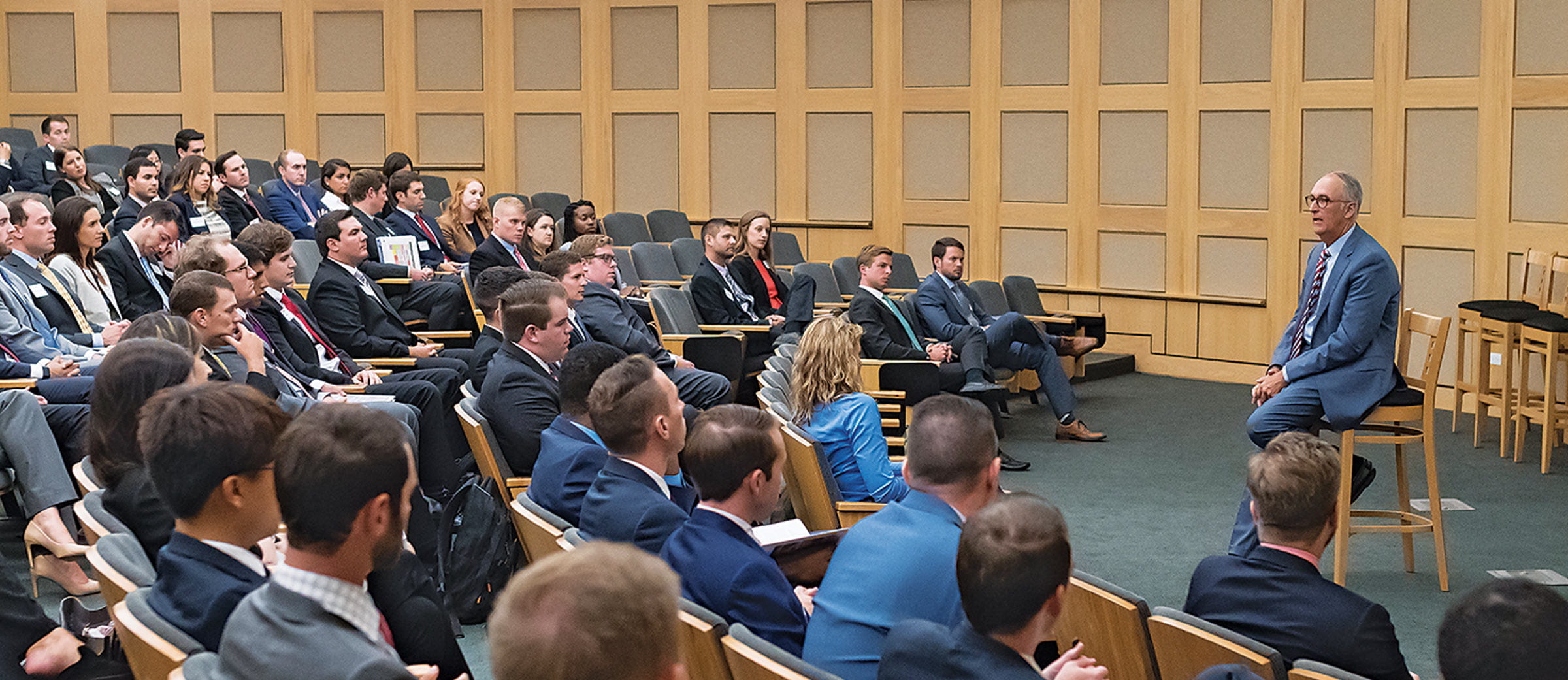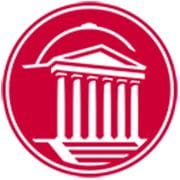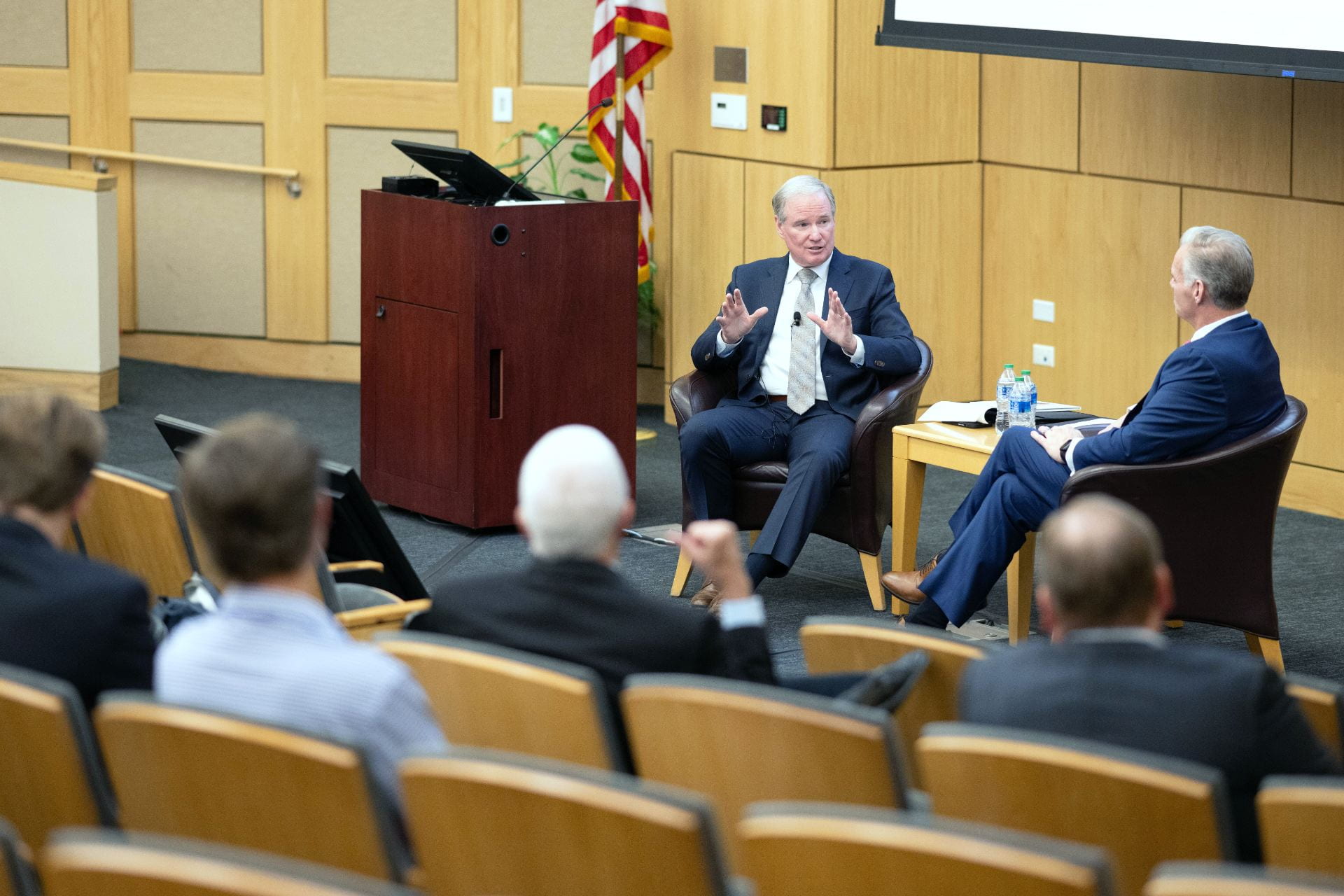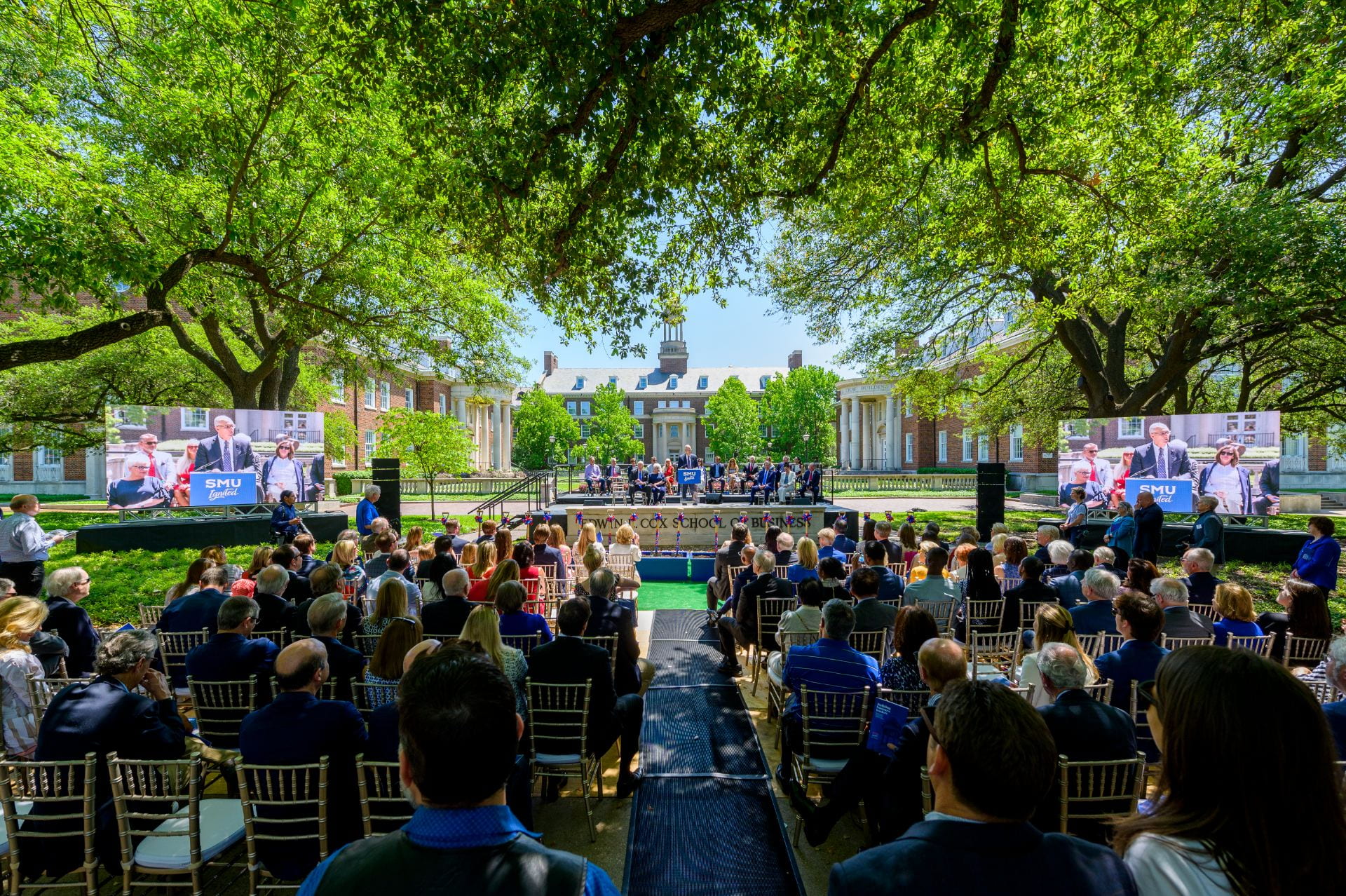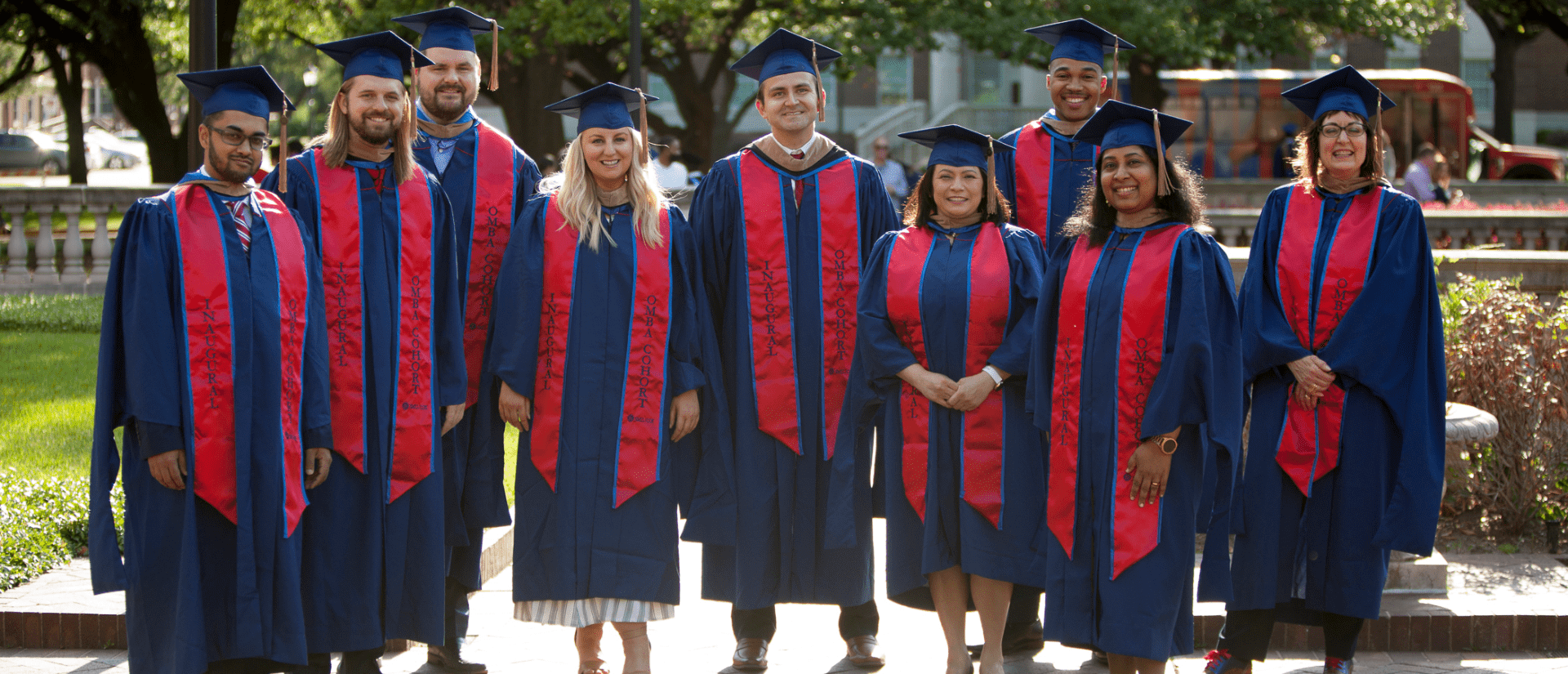Dean Matthew Myers became the ninth dean of the Cox School of Business on August 1, 2017. Building on the Cox School’s strong foundation, Myers plans to innovate and enhance Cox offerings within a growing world-class city context. Meanwhile, he credits the team that has been in place over the last two decades for transformational change at Cox. “This isn’t a time of massive change or finding new directions,” Myers said. “It’s one of building on strengths.”
Formerly the dean at Miami University’s Farmer School of Business in Oxford, Ohio, Dean Myers is frequently asked: “Why Cox?”
“My wife and I were looking for an institution that really understood its place in higher education — one that had high aspirations,” explains Myers. He believes higher education is struggling with its identity today and Cox is rare in this aspect. “People take it for granted that higher education and universities understand who they are and where they want to be. And that’s not always the case.”
The cornerstone of the Cox School is its faculty and staff, Myers strongly believes. He foresees investing in “those behind the podium, behind the computer, as well as undergraduates and graduates.” He also plans to reach across the SMU Campus. “To be competitive with peer institutions, strong relationships with the Lyle Engineering School, Dedman Law School and Dedman College are important. In changing the world we live in, this is a community effort,” he says.
Myers understands what Dean Albert W. Niemi, Jr. accomplished at Cox and recognizes the strong leadership President R. Gerald Turner has provided SMU. Myers’ visit in the spring reinforced this fact. “Coming to Cox and Dallas was the right thing to do,” he recalls. His wife, Gina, and their twin 13 year-old daughters are “taking Dallas by storm.” Deeply smitten by Dallas (and Central Market), his wife tells him she plans never to leave. With the countless cuisines and venues Dallas has to offer, Myers notes, “We are currently eating our way through Dallas. The hospitality here is phenomenal.” Myers views the connection between SMU, the Cox School and Dallas-Fort Worth as a symbiotic and burgeoning opportunity. “Dallas has a robust economy with people willing to invest in Cox and SMU,” he says. “You cannot have a world-class city unless there is a world-class university, and a world-class university cannot exist without a world-class business school.”
Academic leadership
Myers’ scholarly career began in 1997, after he earned his PhD in marketing and international business from Michigan State University. At The University of Tennessee, as the Nestlé Professor, Myers led the large marketing and supply chain management department at the Haslam College of Business from 2008-2010. He then served as the associate dean of executive education from 2010-2013. During his stint in executive education, Myers launched a global executive MBA program in partnership with ESSEC Business School, Paris and Central European University (CEU), Budapest. Myers was also recognized three times as the outstanding faculty member for MBA programs and received the Chancellor’s Award for Globalization Initiatives.

“You cannot have a world-class city unless there is a world-class university, and a world-class university cannot exist without a world-class business school.”
In 2014, Myers became the dean of Miami University’s business school. “The extension to the dean role was very fluid and natural,” he says. “Given the external nature of work and its greater connection to business, it was an area in which I could contribute.”
At Cox, Myers intimately understands that research is imperative for a business school’s reputation. “If you look at the top 30 business schools, the common denominator is excellence in research reputation,” he says. “Teaching and researching complement each other — rather than detract from each other, as some believe.” In the research domain, global marketing and strategy issues have intrigued Myers. He has written extensively on knowledge-sharing in cross-border business relationships, international pricing strategies and comparative marketing systems.
Beyond Borders
Crossing organizational boundaries has been a theme that spans Myers’ career. He initiated cross-disciplinary research collaboration between the Farmer School and Miami’s STEM disciplines, as well as with the Colleges of Engineering and Creative Arts by helping establish the Center for Analytics & Data Science.

“Of almost every business challenge today, some type of global factor, either controllable or uncontrollable, is tied to it.”
With a penchant for global business, Myers served as visiting faculty at ESSEC-Paris and the University of St. Andrews, Scotland. He taught at the Vienna University of Economics as well as in Italy, Romania, Taiwan and Uzbekistan. He has led executive education courses in China, Vietnam, India, Argentina, Chile, Brazil, Hungary and Poland.
“We do not have a choice in business education but to be globally oriented, not just geographically.”
“I have always had an interest in global markets, especially on the macro side,” he says. Specifically, Myers was interested in developing economies and how business impacted their wealth. “Of almost every business challenge today, some type of global factor, either controllable or uncontrollable, is tied to it,” Myers observes.
For Myers, consulting assignments and working in executive education were formative experiences. He likens executive education to consulting, “Teachers learn from students and vice versa. At least it was that way for me.” Myers found that consulting provided relevant context and insight into the challenges executives face. Given his expertise, a wide array of organizations — from the global distribution, chemicals, insurance, education, pharmaceuticals to marketing research — have sought his counsel.
Globally minded
From his service with the U.S. Army Airborne in Central America, Myers developed a firsthand interest in global affairs while living there, which was in turmoil due to the Cold War. “Central America was a poster child of resource misallocation, where 90 percent of the wealth was held by 10 percent. It was a great lesson about how economic growth, if allowed under the right circumstances, could benefit and grow a larger middle class.”
Myers’ research into global supply chains has centered on how the business distribution function could facilitate the distribution of wealth inside an economy. His notion was not based on taxation or redistribution from social programs, but on business activity. “I was fascinated and the data showed this, especially after the wall came down in Eastern Europe in 1989 and in the newly independent states in Sub-Saharan Africa,” he says. “After NAFTA was implemented, there were residual after-effects in Latin America.” The NAFTA issue is salient for Cox both in the types of research that can be produced and topics of discussion in the classroom, he relays. “It’s a very contemporary issue, even minute-by-minute.”
“The practical and relationship side of global business, including neighboring countries such as Mexico, should be a focal point.”
“We do not have a choice in business education but to be globally oriented, not just geographically,” Myers suggests. In particular, he has his sights set on building relationships with both talent and business in Latin America. “The practical and relationship side of global business, including neighboring countries such as Mexico, should be a focal point,” he says.
Developing Business Leaders
To help Cox students succeed, modernization is foremost in Myers mind. He believes Cox should enhance the technology and innovation used in the curriculum. “That’s where the growth sectors are in the global economy,” Myers explains. “Cox graduates should have a place in those sectors after graduation no matter what their major is. It’s certainly something to focus on in the next five to 10 years.”
Exposure to the local and global business world is also critical to student success. “Students have numerous choices in universities, and it’s very competitive,” Myers says. “The strategic relationships we have with the business community are important, as well as being attuned to growth opportunities. Many students want the option to work in entrepreneurial or nonprofit businesses, or they may want to work in London or Seoul with global firms.”
“Exposure to the local and global business world is also critical to student success.”
Myers has discovered that the market is looking for a different type of talent. Companies are investing in employees’ career at earlier stages. “Many gold standard firms are looking at undergraduates with a “4 + 1” education: four years of undergraduate work and a one-year master’s in a discipline such as business analytics, for example,” he says. “They are identifying promising students early in their academic careers.”
Thus, business schools are under pressure. “With organizational structures flattening, more leadership skills are required of younger people,” Myers observes. “It’s being reflected in how companies hire and who they hire. At Cox, students are top-notch young people to begin with, but we will have less time to help them develop.
Partnering for the future
Myers has a rich history in partnering with the business community. At Miami, he created initiatives with start-up incubators and digital initiatives such as the BQ program, developing business leadership in the digital economy. The initiatives, largely funded by new corporate and private donations, were designed to focus business students on the technological, innovation, and entrepreneurial opportunities in Silicon Valley.
“I’m interested in Dallas’ potential with start-up incubators, venture capital and entrepreneurship,” Myers says. “I want to understand how we can be involved.” He finds the corporate community at Cox and in Dallas ‘energetic.’ The community is looking for strong academic relationships to help it face problems and leverage opportunities. “Their support is high and so are their expectations,” Myers summarizes. “Cox is ready to step up to that challenge. That’s how we both grow together.”
“I’m interested in Dallas’ potential with start-up incubators, venture capital and entrepreneurship.”
Though he’s early in his assessment phase, Myers sees a “future push” in executive and continuing education. With a strong foundation laid in the undergraduate and graduate programs, Myers’ goal is to add excellence in executive education, alongside research.
More companies are looking for a full-service provider for all of their needs in one organization, Myers notes. For example, firms are reducing the number of university recruiting relationships from several dozen to a handful, and they want institutional quality at all levels — research, undergraduate, graduate and corporate relationships with programmatic input, he observes. “We want to make sure we are inside that play with all of the major companies, such as American Airlines and GE, and with startups, too,” Myers says. “We think we are there already, but it’s competitive and we have to modernize.”
When he is not attending to the multifaceted duties of a dean, Myers and his family enjoy outdoor activities and travelling. “I have a beautiful wife, lovely twin daughters, and a bird dog who knows she’s gorgeous,” he says. “I’m a big believer in balance and quality of life — with respect to faculty and staff too.” From decades of building leaders, connecting diverse groups, and fostering a global outlook, Myers is uniquely qualified to shape the next generation of business leaders who learn their business accumen at SMU Cox.

